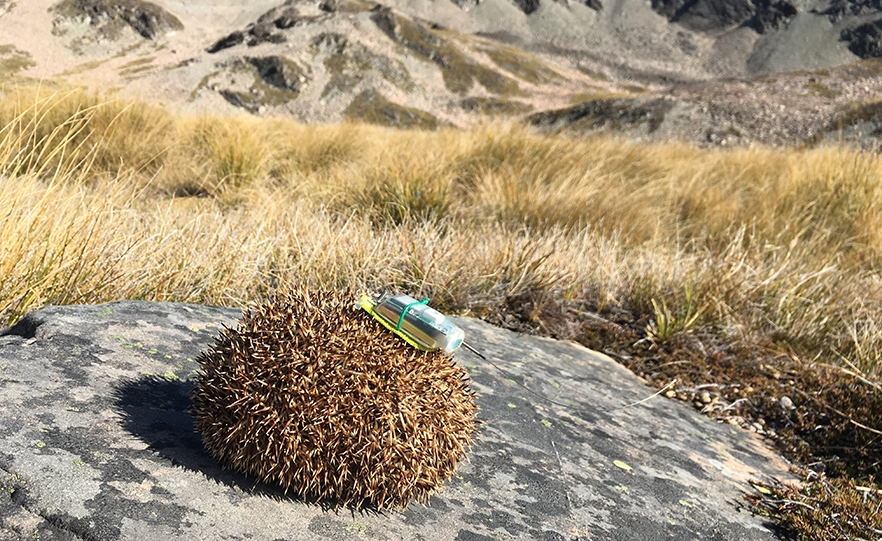Kiwis have a well-deserved international reputation as backpackers and travellers. But Kiwi hedgehogs with a backpack and a GPS – really?
It’s all absolutely true and has even been documented in the eminent publication, the New Zealand Journal of Ecology.
One of those behind these strange goings-on is Dr Nick Foster from the Department of Zoology at the University of Otago, who has been attaching small transmitting ‘backpacks’ onto hedgehogs in the alpine zones of the Mackenzie Basin on the South Island.
The goal was to find out whether hedgehogs, which can be found up to 2000m in summer, travel to lower elevations when the winter weather threatens.
Hardy hedgehogs stay in the high cold areas
“We thought that hedgehogs could be making short-distance movements downhill, which would extend their foraging and breeding season and avoid the harsh winter conditions of the high alpine zone,” Dr Foster explained.
However, instead of moving to lower and warmer areas, Foster found hedgehogs stayed put and hibernated in the colder parts of the elevated alpine areas, which are up to 1800m above sea level. Some of the females were found rearing young, too.
“They entered hibernation in the same areas they used in the summer, and while we only tracked a small sample of females, they all did the same thing,” he said.
“This is pretty convincing evidence that hedgehogs aren’t just visitors in these zones: they’re residents.”
While imagining a hedgehog with a backpack going on an adventure is a cute idea, Dr Foster warned that the mammals need to be seen as harmful to the environment.
Hedgehogs can be among the worst predators
“When we think of predators, we think of stoats, possums and rats. In dryland environments, hedgehogs and feral cats are among the worst.”
At the centre of the research are the GPS transmitters that were fixed onto the back of the hedgehogs as they hibernated.
While a little prickly to handle and quite thin on the ground in the alpine zone, Foster noted that hedgehogs are very easy to work with.
“You can attach a transmitter directly to their spines. There is no collar, no contact with the skin, and there is no feeling in their spines, which are a similar material to our fingernails. Spines regrow after they are clipped and devices fall off as they naturally shed.
“Hedgehogs carry devices well, too. This is a species that piles on fat every year to hibernate, so their bodies can deal with fluctuations in weight.”
Important conclusions from this simple study
There are some important conclusions that can be drawn from this relatively simple study.
“Finding that hedgehogs persist in alpine zones means that if we want to remove [them] from areas, we have to factor in populations living high in the mountains. Otherwise they’ll be around forever and act as a source of reinvasion for lower areas,” Dr Foster said.
On a positive note, once removed, it may be some time for hedgehog populations to spread up to these areas again. This is good news for the strategy of using mountain ranges to keep them out.












